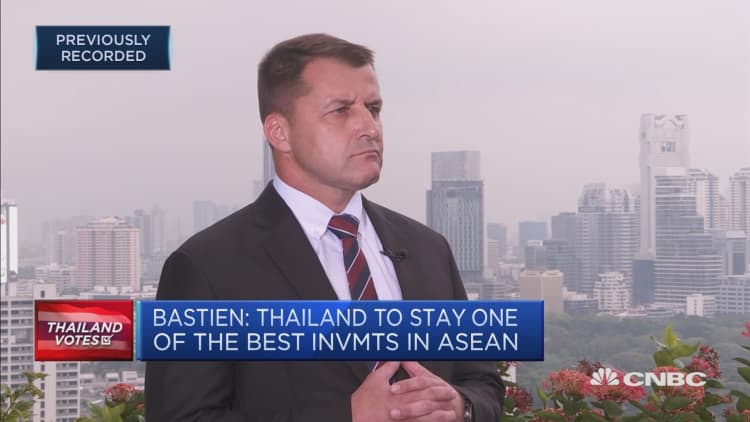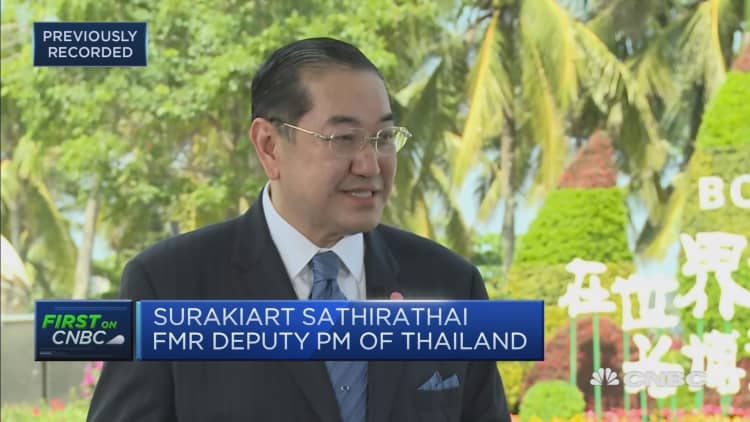Thailand held a long-awaited general election on March 24 after five years of military rule.
But the country's new government will not be formed until May, which is when the final election outcome is expected to be released.
No single party has so far emerged as a clear winner in the lower chamber vote, setting the stage for further uncertainty and political wrangling that could stretch on for months.
On Thursday, the Election Commission of Thailand posted preliminary results on its website — which came after reporters and the public spotted discrepancies in earlier tallies.
Despite the lack of clarity on which way the votes went, two opposing political camps have claimed the right to form the new government.
Pheu Thai, an anti-military party linked to ousted former Prime Minister Thaksin Shinawatra, banded with six other parties. The alliance projected that it has at least 255 out of 500 seats in the House of Representatives, the lower chamber of Thailand's legislative branch.
Meanwhile, the pro-military Palang Pracharat party — which backs junta chief and current Prime Minister Prayuth Chan-o-cha — also said it's putting together a coalition and claimed that its lead in the popular vote shows the Thai people want them in government.
In the March 24 election, political parties contested for House seats representing 350 constituencies. The remaining 150 seats will be allocated according to a complex formula that takes into account each party's popular vote.
The Election Commission has not announced the final number of seats that each party won.
'Serious problems'
For now, analysts said the second-largest economy in Southeast Asia looks set to face a political gridlock that could hinder policy-making and hurt the Thai economy.
Harrison Cheng, associate director and lead Thailand analyst at political consultancy Control Risks, wrote in a note last week that the new government — regardless of which coalition takes control — "will likely run into serious problems trying to pass laws" due to a divided parliament.
It's still too early to say whether the whole process is free and fair.Surakiart Sathirathaiformer Thai cabinet member
"Policy reforms and regulatory changes will therefore be at risk of being stonewalled in parliament. Passing the budget will also be a challenge," he said.
Many analysts expect the anti-military coalition to eventually secure a simple majority in the House, but it may not be able to form the next government. That's because the upper chamber, the Senate, will have 250 members appointed by the current junta and has a hand in appointing the next prime minister. Senators also have the power to influence policy directions and veto certain bills.

Assuming that all 250 senators support Prime Minister Prayuth staying in office, pro-military parties will only need 126 seats in the House to lead the country through a minority government, analysts said.
But, before the final results are revealed in May, the Election Commission could still disqualify candidates and parties to make way for by-elections — which could alter the eventual make-up of the Thai parliament and government.
Alleged unfairness
Despite uncertainties surrounding the election outcome, the fact that the March 24 election was held is an achievement by itself, said Surakiart Sathirathai, a former Thai cabinet minister.
Sathirathai was foreign affairs minister and deputy prime minister under exiled former leader Thaksin Shinawatra.
"Two, three months before that, people were skeptical whether there would be the election, whether there would be a postponement of the election," he told CNBC's Martin Soong on Thursday at the Boao Forum in China's Hainan province.

He also called on the Election Commission to clear up allegations of irregularities in the way votes were tallied.
In several cases brought up by Thai social media users, the number of ballots cast in some constituencies exceeded the total eligible voters in that area. In another incident, the Election Commission voided ballots from Thai expats in New Zealand because they were not delivered to their respective constituencies before voting ended.
The commission has not addressed all the criticisms of its actions since the vote. It also didn't respond to CNBC's request for comment.
Until the agency clears the air, "it's still too early to say whether the whole process is free and fair," said Sathirathai.
"But I think the process has been peaceful, there are no clashes between different groups of people, and I think people have (a) very high level of enthusiasm about the election — that's something I'm very happy to see," he added.


